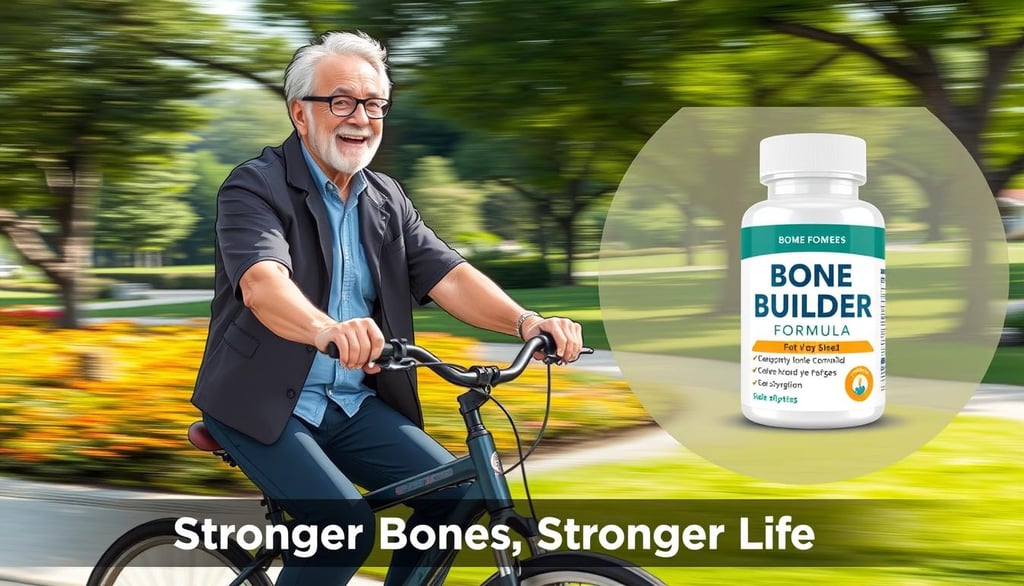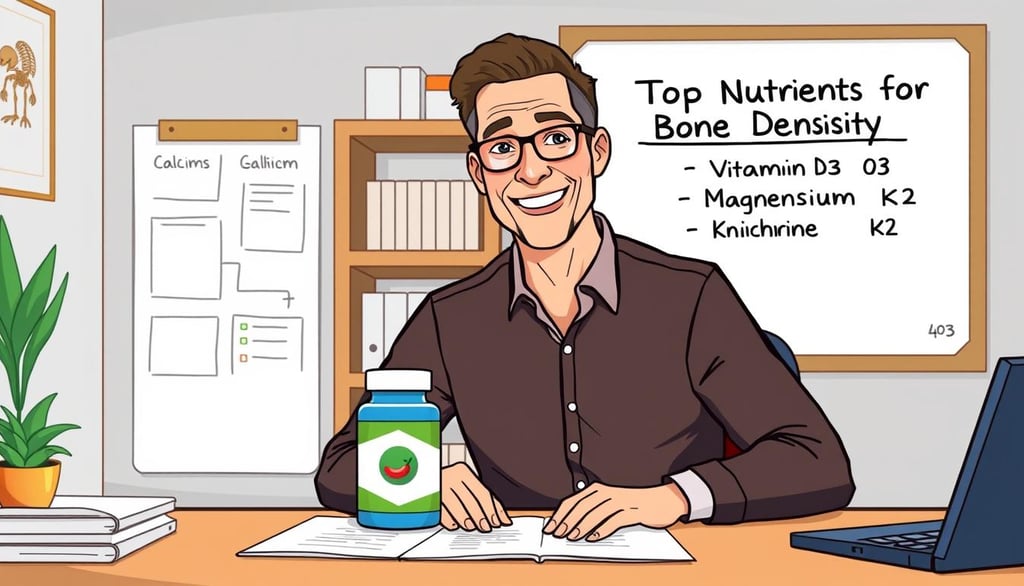Searching for the best supplement for bone density that really works?
Discover the best supplement for bone density to strengthen your bones. Learn more about top-rated options and their benefits for overall health.
BONES & BODY WEIGHT
ActiveVitaLife
5/19/20259 min read
Best Supplement for Bone Density, The Ultimate Guide.
Many people overlook the role of nutritional support in maintaining strong bones. While diet and exercise matter, certain supplements can help slow bone loss. Calcium citrate, vitamin D3, and collagen peptides are among the top choices. But how do you know which one works best for you?
Key Takeaways
Osteoporosis impacts millions, especially adults over 50.
Early prevention through diet and lifestyle is crucial.
Fractures affect 50% of women and 25% of men in this age group.
Certain nutrients can help maintain bone strength.
Calcium, vitamin D, and collagen are common options.
Why Bone Health Matters: Understanding Osteoporosis
Osteoporosis silently weakens bones, often going unnoticed until a fracture occurs. This disease reduces bone mass and density, making them fragile. A simple stumble can lead to broken hips, wrists, or spines, especially in older adults.
What Is Osteoporosis and How Does It Develop?
Bones are living tissues that constantly rebuild. Until your early 30s, they gain strength. After that, breakdown outpaces growth. By age 50, many lose 1% of bone mass yearly. Osteoporosis speeds this process, leaving bones porous like honeycombs.
DEXA scans detect it early. The Cooper Clinic found these tests reveal thinning bones before fractures happen. Sadly, 10% of women over 50 already have hip osteoporosis, per the CDC.
Who Is Most at Risk?
Women face higher risk due to smaller frames and menopause’s hormonal shifts. Estrogen loss accelerates bone loss. Men aren’t immune—1 in 5 men over 50 develops osteoporosis.
Other risk factors include:
Low calcium or vitamin D intake
Smoking or heavy alcohol use
Slim body types (less protective fat)
Caucasian or Asian ethnicity
Certain medications, like proton pump inhibitors, also weaken bones. Even antidepressants (SSRIs) may play a role. Fragility fractures—breaks from minor falls—are often the first warning sign.
Key Nutrients for Strong Bones
Strong bones rely on a precise balance of essential nutrients. While calcium often steals the spotlight, vitamins and minerals work together to maintain skeletal strength. Missing even one piece of this puzzle can weaken your framework over time.
Calcium: The Foundation of Bone Density
Your body stores 99% of its calcium in bones, according to the Cooper Clinic. This mineral isn’t just for skeletal structure—it also helps regulate blood pressure and muscle function.
Not all calcium supplements absorb equally:
Calcium citrate: Best taken on an empty stomach; ideal for older adults or those with low stomach acid.
Calcium carbonate: Requires food for absorption; offers higher elemental calcium per dose.
Vitamin D: The Calcium Absorber
Without enough vitamin D, your body absorbs just 15% of dietary calcium. The Cooper Clinic warns that deficiencies are common, especially in northern climates or among indoor workers.
Adults need 600–800 IU of vitamin D daily to optimize calcium uptake.
Sunlight triggers natural production, but foods like fatty fish and fortified dairy products help bridge gaps.
Magnesium and Vitamin K2: Supporting Players
Magnesium glycinate (120 mg/day) aids calcium metabolism without laxative side effects. Meanwhile, vitamin K2 acts like a traffic cop, directing calcium to bones instead of arteries.
Pair these nutrients with weight-bearing exercise for maximum impact. Together, they form a defense against gradual bone loss.
Top 5 Evidence-Based Supplements for Bone Density
Building stronger bones requires more than just diet—science-backed supplements can fill critical gaps. These options are clinically proven to support skeletal health, especially for those at risk of low density.
Calcium Citrate vs. Carbonate: Which Is Better?
Calcium citrate absorbs well without food, making it ideal for older adults or those with digestive issues. Cooper Complete notes its superior bioavailability compared to carbonate.
Calcium carbonate, however, packs more elemental calcium per dose but needs meals for optimal uptake. Choose citrate for flexibility or carbonate for cost efficiency.
Vitamin D3: Dosage and Sources
Without enough vitamin D3, your body struggles to use calcium effectively. Blood tests help tailor doses—typically 1,000–5,000 IU daily.
Deficiency is common in northern climates; fatty fish and fortified foods help bridge gaps.
Magnesium Glycinate: Benefits and Absorption
This form supports bone cellular activity without digestive side effects. Studies suggest 120 mg/day enhances calcium metabolism and muscle function.
Vitamin K2: The Bone Builder
It directs calcium to bones, not arteries. Dr. Rula recommends 45–180 mcg/day, especially for postmenopausal women.
Collagen Peptides: Strengthening Bone Matrix
A Cooper Clinic study found collagen boosted spine density in 12 months. Its proteins comprise 30% of bone structure, making it a vital addition.
Pair these with weight-bearing exercise for bones strong enough to last a lifetime.
How to Choose the Best Supplement for Bone Density
Bioavailability determines whether a product delivers real benefits or just passes through. Your body absorbs nutrients differently based on their chemical forms. This makes ingredient quality as important as dosage when selecting support for skeletal strength.
What Your Body Actually Absorbs
Chelated minerals bond nutrients to amino acids for better uptake. Research shows these forms—like magnesium glycinate—absorb 2-3 times better than standard versions. The Cooper Clinic advises this approach for optimal results.
Watch for these absorption boosters:
Calcium citrate (with meals for acidic environment)
Vitamin D3 paired with healthy fats
Magnesium taken separately from calcium
"Never exceed 500 mg calcium per serving—spread intake throughout the day for maximum absorption." —Cooper Clinic
Combination Formulas vs. Standalone Options
Multi-nutrient blends like Cooper Complete Collagen Complex simplify routines but may lack personalized dosing. These often include:
Hyaluronic acid for joint support
Vitamin C for collagen production
Targeted mineral ratios
Test vitamin D levels before supplementing—blood work reveals your ideal dose. Pair any regimen with weight-bearing exercise for comprehensive support. Timing matters too; take magnesium at a different time than calcium for full benefits.
Daily Requirements: How Much Do You Really Need?
Your skeletal system's needs change dramatically throughout life—are you meeting them? The right amount of calcium, vitamin D, and magnesium depends on your age, gender, and risk factors. NIH guidelines provide a roadmap, but individual testing ensures precision.
Tailoring Intake to Life Stages
Teens need 1,300 mg of calcium daily to support rapid growth. By contrast, adults under 50 require 1,000 mg, while women over age 50 and men over 70 need 1,200 mg/day. These thresholds reflect shifting bone turnover rates.
Magnesium follows similar patterns:
Adults 31+: 320–420 mg/day
Postmenopausal women: Higher needs due to reduced absorption
When and How to Test Levels
The Cooper Clinic recommends baseline DEXA scans at age 40 for women and 60 for men. Vitamin D blood tests should start earlier—especially for high-risk groups like:
Office workers with limited sun exposure
Those with dark skin (lower natural synthesis)
"Annual vitamin D testing is wise after 40—deficiency often shows no symptoms until bones weaken."
Calcium has a "sweet spot." Excess (over 2,500 mg/day) may harm cardiovascular health. Pair testing with dietary audits to avoid imbalances.
Food First: Natural Sources of Bone-Building Nutrients
Your plate plays a powerful role in maintaining skeletal strength. While supplements help, whole foods provide a complex mix of nutrients that work synergistically. The Cooper Clinic emphasizes that a balanced diet lays the foundation for lifelong bone health.
Beyond Milk: Unexpected Calcium Powerhouses
Dairy isn’t the only way to meet your daily calcium needs. Many plant-based and seafood options pack even more punch per serving:
Collard greens: 266 mg per cooked cup—more than most yogurts
Sardines with bones: 325 mg in just 3 ounces
Tofu (calcium-set): Provides 20% of your daily value per half-cup
Even fortified almond milk offers 200 mg per cup. Compare that to low-fat cow’s milk at 316 mg, or Greek yogurt averaging 200 mg per serving.
Sunshine and Seafood: Vitamin D Done Right
Your skin manufactures vitamin D when exposed to UVB rays—but geography matters. Those north of Atlanta get insufficient sunlight from November to February, per NIH data.
"Aim for 10–30 minutes of midday sun exposure 3x weekly—longer for darker skin tones."
Dietary sources become crucial in winter:
Wild-caught salmon: 570 IU per 3 oz
Mackerel: 360 IU per serving
Fortified cereals: Up to 100 IU per cup
Remember: Mushrooms exposed to UV light also provide this vital nutrient. Pair them with healthy fats to enhance absorption.
Lifestyle Habits to Maximize Supplement Benefits
Your daily choices determine whether your skeletal system stays resilient. While nutrients lay the foundation, habits like movement and avoiding toxins ensure they work effectively. Research shows lifestyle changes can reduce fracture risk by 21%.
Move It or Lose It: Exercise for Resilience
Weight-bearing activities trigger bone remodeling. The Cooper Clinic recommends:
Walking or stair climbing 30 minutes daily
Resistance training 3x/week to keep bones strong
Tai chi for balance and fall prevention
"Mediterranean diets paired with exercise cut hip fractures by 21%." —Cooper Clinic
Ditch the Saboteurs
Smoking slashes bone density 2–4% yearly by starving tissues of oxygen. Alcohol disrupts calcium absorption—limit to 1 drink/day for women, 2 for men. Both habits harm heart health too.
Protein builds the bone matrix. Aim for 0.8g per pound of body weight from fish, beans, or lean meats. Pair these habits with your regimen to maintain strong bones for decades.
Supplements to Avoid for Bone Health
Not all products marketed for skeletal support deliver safe results. Some ingredients interfere with tests or pose hidden risks, especially for older adults. Knowing what to skip helps protect long-term wellness.
The Truth About Strontium and False Density Readings
Strontium citrate, often promoted for bone strength, artificially inflates DEXA scan results. Dr. Rula warns it replaces calcium in tissue, creating misleading density readings. European studies link strontium ranelate to heart complications.
Key concerns include:
Distorted scans masking actual disease progression
Cardiovascular risk from long-term use
Reduced calcium absorption in critical areas
Other Potentially Harmful Additives
Certain medications and mega-doses of minerals backfire. Proton pump inhibitors (PPIs) reduce calcium uptake by 60%, per NIH data. Antidepressants (SSRIs) and diabetes drugs (thiazolidinediones) also accelerate bone loss.
"Excess zinc or iron blocks calcium absorption—stick to RDA limits."
For men and women alike, balance is key. Always consult a doctor before mixing prescriptions with over-the-counter formulas.
Conclusion: Building a Bone-Healthy Routine
Protecting your skeletal strength requires a smart approach. Key nutrients like calcium citrate, vitamin D3, and magnesium glycinate work together to keep bones resilient. Add vitamin K2 to guide minerals where they’re needed most.
Combine these with weight-bearing exercise and calcium-rich foods. Aim for 1,000 mg daily from sources like collard greens or sardines. Don’t forget DEXA scans—starting at 40 helps catch issues early.
Products like Cooper Complete offer clinically tested formulas. Their blends simplify routines while ensuring proper absorption. Remember, consistency with diet, movement, and targeted support builds lasting health.
Small steps today prevent big problems tomorrow. Your future self will thank you.
FAQ
What is osteoporosis and how does it develop?
Osteoporosis is a condition where bones weaken, becoming porous and fragile. It develops when the body loses too much bone mass or doesn’t make enough, often due to aging, hormonal changes, or nutrient deficiencies.
Who is most at risk for osteoporosis?
Women over 50, especially postmenopausal, face higher risks. Men over 70, people with low calcium intake, sedentary lifestyles, or a family history of fractures are also vulnerable.
Why is calcium important for bone strength?
Calcium is the primary mineral in bones, providing structure. Without enough, the body pulls it from bones, weakening them over time. Adults need 1,000–1,200 mg daily.
How does vitamin D help bones?
Vitamin D helps the gut absorb calcium. Without it, bones can’t use calcium effectively. Aim for 600–800 IU daily, or more if deficient.
What’s better: calcium citrate or carbonate?
Citrate absorbs well with or without food, ideal for older adults. Carbonate needs stomach acid, so take it with meals. Both boost density when paired with vitamin D.
Can food alone provide enough bone-supporting nutrients?
Dairy, leafy greens, and fatty fish offer calcium and vitamin D, but many need supplements to meet daily needs, especially in low-sun climates or with dietary restrictions.
How does exercise improve bone health?
Weight-bearing activities (walking, lifting weights) stimulate bone growth. Aim for 30 minutes daily to maintain strength and reduce fracture risk.
Are collagen peptides effective for bones?
Yes. Collagen provides proteins that strengthen the bone matrix. Studies suggest 10–15 grams daily may improve density and joint health.
Should I avoid strontium supplements?
Strontium can artificially inflate bone scan results, masking real density issues. Opt for proven nutrients like calcium, vitamin D, and K2 instead.
When should I test my vitamin D levels?
Get tested if you have limited sun exposure, dark skin, or symptoms like fatigue. Optimal blood levels are 30–50 ng/mL for bone protection.
Read the Article: Looking for natural pills for joint pain relief that actually work?
Activevitalife
Your Guide to Weight Management & Muscle Building
Contact:
Trust
contact@activevitalife.click
© 2025. All rights reserved.
Disclaimer: The information provided on this blog is for general informational and educational purposes only and should not be considered medical advice. The content is not intended to diagnose, treat, cure, or prevent any disease or health condition.








